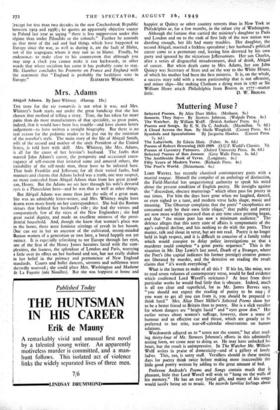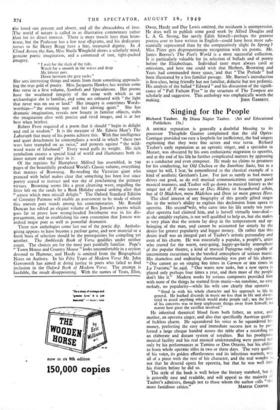Muttering Muse ?
Selected Poems. By Alice Duer Miller. (Methuen. 5s.) 7s. 6d.) The Labyrinth. By Edwin Muir. (Faber. 8s. 6d.) Fifty Years of Modern Verse. (Richards Press. 6s.) The Poet's World. (Heinemann. 6s.) Loan WAVELL has recently chastised contemporary poets with a martial tongue. Himself the compiler of an anthology of distinction, the Field-Marshal has unquestioned authority to speak his mind about the present condition of English poetry. He inveighs against the " discordant, obscure mutterings " which often pass for poetry in our times. For him the days have gone when we laughed, danced, or even sighed to a tune, and modern verse lacks shape, music and meaning. The Observer complains that the poets' "cacophonics are consumed only by their own little clique," that public and poetry are now more widely separated than at any time since printing began, and that " the minor poet has now a minimum audience." The defence alleges that this sorry state of affairs is symptomatic of the age's cultural decline, and has nothing to do with the poets. They mutter, talk and shout in verse, but are not read. Poetry is no longer held in high respect, and it is difficult to conceive of a family today which would conspire to delay police investigations so that a murderer could complete "a great poetic sequence." This is the situation in Mr. Day Lewis's last novel, Death of a Stranger, where the Poet's (the capital indicates his former prestige) creative powers are liberated by murder, and the detective on reading the result claims that " it's worth everything."
What is the layman to make of all this ? If his lot, like mine, was to read seven volumes of contemporary verse, would he find evidence which confirmed Lord Wavers strictures ? At least from these particular works he would find little that is obscure. Indeed, much is all too clear and superficial, for as Mr. James Reeves says, "you should not expect the reading of poetry to be easy ; if you want to get all you can from it, you should be prepared to think hard." Mrs. Alice Duer Miller's Selected Poems show her to be a better friend to Britain than to poetry. She is a slick versifier for whom dangers are " bright faced " and "eyes grow dim." Her earlier verses about women's suffrage, however, show a sense of humour and an effective cut and thrust, which are greatly to be preferred to her trite, tear-off-calendar observations on human relations.
Wordsworth adjured us to " scorn not the sonnet," but after read- ing thirty-four of Mr. Stowers Johnson's efforts in this admittedly testing form, we come near to doing so. He may have unlocked his heart, but the result is unimpressive. In The Watcher Mr. William Wolff writes in praise of domesticity—and of a gallery of lovely ladies. This, too, is sorry stuff. Versifiers should in these testing days for poetry think twice before making more inaccessible the little good poetry written by adding to the great amount of bad.
Professor Andrade's Poems and Songs contain much that is pleasant, little that Lord Wavell will wish to " hang on the walls of his memory." He has an easy lyrical gift, and many of his songs would justify being set to music. He records familiar feelings about he loved one present and absent, and all the abracadabra of love. The world of nature is called in as illustrative commentary rather ?than for its direct interest. There is more treacle here than brim- stone, but the Professor has a few neat eiSigrams, and his dedicatory verses to Sir Henry Bragg have a fine, measured dignity. In A liCloud Across the Sun, Miss Sheila Wingfield shows a scholarly mind, ,genuine poetic imagination, and a command of taut, tight-packed imagery. “ I wait for the slack of the tide,
Watch for a smooth in the waves and drop My lobster pots Down between the grey rocks."
She sees interesting things and mints from them something approach- ing the true gold of poetry. Miss Jacquetta Hawkes has written some fine verse in a first volume, Symbols and Speculations. Her poems have the weathered integrity of the stone with which as an archaeologist she is familiar, and some are coloured with " the light that never was on sea or land." Her imagery is sometimes Words- worthian—" the evening nun and her adoring quiet." She has 'dramatic imagination, reveals new beauty in familiar objects, stabs the imagination alive with precise and vivid images, and is at her best when briefest.
Robert Frost required of a poem that it should " begin in delight and end in wisdom." It is the measure of Mr. Edwin Muir's The Labyrinth that many of his poems achieve this. With fine intelligence and quiet detachment he contemplates a world in which " these two wars have trampled on us twice," and protests against " the wild- wood waste of falsehood." Every word pulls its weight. His rich symbolism creates a special kind of world and illuminates both its inner nature and our place in it. Of the reprints Sir Humphrey Milford has assembled, in 709 pages of the beautifully produced World's Classic volume, everything that matters of Browning. Re-reading the Victorian giant who pranced with belief makes clear that something has been lost since poetry ceased to instruct and was shy of proclaiming the primary virtues. Browning seems like a great cleansing wave, engulfing the litter left on the sands by a Bank Holiday crpwd seeking after that ," unrest which men miscall delight." The Oxford Standard Edition of Coventry Patmore will enable an assessment to be made of where this uneven poet stands among his contemporaries. Mr. Ronald Duncan has edited an elegant volume of Ben jonson's poems which goes far to prove how wrong-headed Swinburne was in his dis- paragement, and to establishing his own contention that Jonson was indeed major poet as well as powerful dramatist.
Three new anthologies come last out of the poetic dip. Antholo- gising appears to have become a parlour game, and new material or a fresh basis of selection should be the prerequisites for compiling yet another. The Ambleside Book of Verse qualifies under neither count. The choices are for the most part painfully familiar. Pope's " Town Mouse and Country Mouse " looks uncomfortable in a section devoted to Humour, and Hardy is omitted from the Biographical Notes on Authors. In his Fifty Years of Modern Verse Mr. John Gawsworth has aimed at doing justice to poets who failed to find inclusion in the Oxford Book of Modern Verse. The attempt is 'laudable, the result disappointing. With the names of Yeats, Eliot, Owen, Hardy and Day Lewis omitted, the residuum is unimpressive. He does well to publish some good work by Alfred Douglas and L. A. G. Strong, but surely Edith Sitwell—perhaps the greatest poetess ever to have written in English—could have been more sub- stantially represented than by the comparatively slight In Spring ? Miss Pitter gets disproportionate recognition with six poems. Mr. James Reeves's The Poet's World is a most successful collection. It is particularly valuable for its selection of ballads and of poetry before the Elizabethans. Individual taste must always cavil at omissions, and here one could wish that Herbert, Browning and Yeats had commanded more space, 'and that "The Prelude" had been illustrated by a less familiar passage. Mr. Reeves's introduction is first-class, being friendly but not familiar, didactic but not pedantic. His analysis of the ballad " Edward " and his discussion of the signifi- cance of " Full Fathom Five " in the structure of The Tempest are scholarly and suggestive. This anthology was emphatically worth the































 Previous page
Previous page